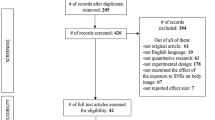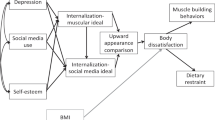Abstract
We examined the relationships between promotion and prevention focus and caloric consumption in reaction to a dietary lapse scenario among weight loss maintainers. Participants were 65 adult females who had attained and maintained a weight loss of 10 % or more for at least 1 month. After engaging in a dietary lapse in a feeding laboratory, participants completed a “bogus” taste test, during which they could consume as much food as they liked. It was hypothesized that promotion and prevention focus would predict caloric consumption, mediated by depressive and anxious affect. Prevention focus, but not promotion focus, was positively associated with proportion of daily calories consumed. Affect was not a mediator. Prevention focus may be deleterious for dietary maintenance following dietary lapses. Theoretical and clinical implications are discussed in light of prior research. Limitations of the study and recommendations for future research also are presented.

Similar content being viewed by others
References
Baron, R. M., & Kenny, D. A. (1986). The moderator–mediator variable distinction in social psychological research: Conceptual, strategic, and statistical considerations. Journal of Personality and Social Psychology, 51(6), 1173–1182.
Barte, J. M., Ter Bogt, N. W., Bogers, R. P., Teixeira, P. J., Blissmer, B. B., Mori, T. A., & Bemelmans, W. E. (2010). Maintenance of weight loss after lifestyle interventions for overweight and obesity, a systematic review. Obesity Reviews, 11(12), 899–906.
British Broadcasting Company (2007). Planet Earth. BBC, 2007.
Carels, R. A., Douglass, O. M., Cacciapaglia, H. M., & O’Brien, W. H. (2004). An ecological momentary assessment of relapse crises in dieting. Journal of Consulting and Clinical Psychology, 72(2), 341–348.
Carels, R. A., Hoffman, J., Collins, A., Raber, A. C., Cacciapaglia, H., & O’Brien, W. H. (2001). Ecological momentary assessment of temptation and lapse in dieting. Eating Behaviors, 2(4), 307–321. doi:10.1016/S1471-0153(01)00037-X.
Carver, C. S. (2004). Self-regulation of action and affect. In R. F. Baumeister & K. D. Vohs (Eds.), Handbook of self-regulation: Research, theory, and applications (pp. 13–39). New York: Guilford Press.
Christenfeld, R., Lubin, B., & Satin, M. (1978). Concurrent validity of the depression adjective check list in a normal population. The American journal of psychiatry.
Dickson, J. M., & MacLeod, A. K. (2004). Brief report: Anxiety, depression and approach and avoidance goals. Cognition and Emotion, 18, 423–430.
Elfhag, K., & Rossner, S. (2005). Who succeeds in maintaining weight loss? A conceptual review of factors associated with weight loss maintenance and weight regain. Obesity Reviews, 6, 67–85.
Elliot, A. J., & Sheldon, K. M. (1997). Avoidance achievement motivation: A personal goals analysis. Journal of Personality and Social Psychology, 73, 171–185.
Elliot, A. J., & Thrash, T. M. (2002). Approach-avoidance motivation in personality: Approach and avoidance temperaments and goals. Journal of Personality and Social Psychology, 82, 804–818.
Flint, A., Raben, A., Blundell, J. E., & Astrup, A. (2000). Reproducibility, power and validity of visual analogue scales in assessment of appetite sensations in single test meal studies. International Journal of Obesity and Related Metabolic Disorders: Journal of the International Association for the Study of Obesity, 24(1), 38–48.
Fowles, D. C. (1994). A motivational theory of psychopathology. In W. D. Spaulding (Ed.), Integrative views of motivation, cognition, and emotion : Vol. 41 of the Nebraska symposium on motivation (pp. 181–238). Lincoln, NE: University of Nebraska Press.
Fuglestad, P. T., Rothman, A. J., & Jeffery, R. W. (2008). Getting there and hanging on: The effect of regulatory focus on performance in smoking and weight loss interventions. Health Psychology, 27, S260–S270.
Gray, J. A. (1990). Brain systems that mediate both emotion and cognition. In J. Gray (Ed.), Psychobiological aspects of relationships between emotion and cognition (pp. 269–288). London: Lawrence Erlbaum Associates Ltd.
Gray, J. (1994). Personality dimensions and emotion systems. In P. Ekman & R. J. Davidson (Eds.), The nature of emotion: Fundamental questions (pp. 329–331). New York: Oxford University Press.
Higgins, E. T. (1997). Beyond pleasure and pain. American Psychologist, 52, 1280–1300.
Higgins, E. T. (2012). Regulatory focus theory. In P. M. Van Lange, A. W. Kruglanski, & E. T. Higgins (Eds.), Handbook of theories of social psychology (Vol 1) (pp. 483–504). Thousand Oaks, CA: Sage Publications Ltd.
Higgins, E. T., Friedman, R. S., Harlow, R. E., Idson, L. C., Ayduk, O. N., & Taylor, A. (2001). Achievement orientations from subjective histories of success: Promotion pride versus prevention pride. European Journal of Social Psychology, 31, 3–23.
Jeffery, R. W., Drewnowski, A., Epstein, L. H., Stunkard, A. J., Wilson, G. T., Wing, R. R., & Hill, D. R. (2000). Long-term maintenance of weight loss: current status. Health Psychology, 19, 516.
Kendall, P. C., Finch, A. J, Jr, Auerbach, S. M., Hooke, J. F., & Mikulka, P. J. (1976). The State-trait anxiety inventory: a systematic evaluation. Journal of Consulting and Clinical Psychology, 44, 406–412.
Kenny, D. A. (2008). Reflections on mediation. Organizational Research Methods, 11(2), 353–358.
Kirschenbaum, D. S. (1987). Self-regulatory failure: A review with clinical implications. Clinical Psychology Review, 7, 77–104.
Klem, M. L., Wing, R. R., McGuire, M. T., Seagle, H. M., & Hill, J. O. (1997). A descriptive study of individuals successful at long-term maintenance of substantial weight loss. American Journal of Clinical Nutrition, 66, 239–246.
Klenk, M. M., Strauman, T. J., & Higgins, E. T. (2011). Regulatory focus and anxiety: A self-regulatory model of GAD-depression comorbidity. Personality and Individual Differences, 50(7), 935–943. doi:10.1016/j.paid.2010.12.003.
Knight, L. J., & Boland, F. J. (1989). Restrained eating: An experimental disentanglement of the disinhibiting variables of perceived calories and food type. Journal of Abnormal Psychology, 98(4), 412.
Kruger, J., Blanck, H. M., & Gillespie, C. (2006). Dietary and physical activity behaviors among adults successful at weight loss maintenance. The International Journal of Behavioral Nutrition and Physical Activity, 3, 17.
Lee, J. M., Greening, L., & Stoppelbein, L. (2007). The moderating effect of avoidant coping on restrained eaters’ risk for disinhibited eating: Implications for dietary relapse prevention. Behaviour research and therapy, 45(10), 2334–2348.
Lubin, B. (1967). State trait: Depression adjective check lists. San Diego, CA: Educational and Industrial Testing Service.
Lubin, B. (2002). State trait: Depression adjective check lists: Professional manual. San Diego, CA: Educational and Industrial Testing Service.
Marlatt, G. A., & Gordon, J. R. (Eds.). (1985). Relapse prevention: Maintenance strategies in the treatment of addictive behaviors. New York: Guilford Press.
McGuire, M. T., Wing, R. R., Klem, M. L., Lang, W., & Hill, J. O. (1999). What predicts weight regain in a group of successful weight losers? Journal of Consulting and Clinical Psychology, 67, 177–185.
Mooney, J. P., Burling, T. A., Hartman, W. M., & Brenner-Liss, D. (1992). The Abstinence Violation Effect and very low calorie diet success. Addictive Behaviors, 17(4), 319–324. doi:10.1016/0306-4603(92)90038-W.
National Academy of Sciences (2002). Dietary reference intakes: Recommended intakes for individuals. Retrieved August 1, 2008. from http://www.iom.edu/Object.File/Master/21/372/0.pdf.
Parker, B. A., Sturm, K., MacIntosh, C. G., Feinle, C., Horowitz, M., & Chapman, I. M. (2004). Relation between food intake and visual analogue scale ratings of appetite and other sensations in healthy older and young subjects. European Journal of Clinical Nutrition, 58(2), 212–218.
Polivy, J. (2002). Perception of calories and regulation of intake in restrained and unrestrained subjects. Addictive Behaviors, 1, 237–243.
Rodebaugh, T. L., & Heimberg, R. G. (2008). Emotion regulation and the anxiety disorders: Adopting a self-regulation perspective. In A. Vingerhoets, I. Nyklicek, & J. Denollet (Eds.), Emotion regulation: Conceptual and clinical issues (pp. 140–149). New York: Springer.
Ross Middleton, K. M., Patidar, S. M., & Perri, M. G. (2012). The impact of extended care on the long-term maintenance of weight loss: a systematic review and meta-analysis. Obesity Reviews, 13(6), 509–517.
Spielberger, C. D., Gorsuch, R. L., Lushene, R., Vagg, P. R., & Jacobs, G. A. (1983). Manual for the State-trait anxiety inventory (Form Y). Palo Alto, CA: Consulting Psychologists Press.
SPSS Inc. Released 2008. SPSS Statistics for Windows, Version 17.0. Chicago: SPSS Inc.
Strauman, T. J. (1996). Stability within the self: A longitudinal study of the structural implications of self-discrepancy theory. Journal of Personality and Social Psychology, 71, 1142–1153. doi:10.1037/0022-3514.71.6.1142.
Weiss, E. C., Galuska, D. A., Kettel, K. L., Gillespie, C., & Serdula, M. K. (2007). Weight regain in U.S. adults who experienced substantial weight loss, 1999–2002. American Journal of Preventive Medicine, 33, 34–40.
Wing, R. R., & Phelan, S. (2005). Long-term weight loss maintenance. The American Journal of Clinical Nutrition, 82, 222S–225S.
Worth, K. A., Sullivan, H. W., Hertel, A. W., Jeffery, R. W., & Rothman, A. J. (2005). Avoidance goals can be beneficial: A look at smoking cessation. Basic and Applied Social Psychology, 27(2), 107–116.
Acknowledgments
This research was supported in part by the Center for Obesity Research and Education at Temple University. The authors wish to thank Dr. Gary Foster for his valuable guidance regarding study design and implementation.
Conflict of interest
Rylan Jay Testa, Ph.D. and Ronald T. Brown, Ph.D. declare that they have no conflict of interest.
Human and Animal Rights and Informed Consent
All procedures followed were in accordance with the ethical standards of the responsible committee on human experimentation of Temple University’s Institutional Review Board and with the Helsinki Declaration of 1975, as revised in 2000. Informed consent was obtained from all participants for being included in the study.
Author information
Authors and Affiliations
Corresponding author
Rights and permissions
About this article
Cite this article
Testa, R.J., Brown, R.T. Self-regulatory Theory and Weight-Loss Maintenance. J Clin Psychol Med Settings 22, 54–63 (2015). https://doi.org/10.1007/s10880-015-9421-z
Published:
Issue Date:
DOI: https://doi.org/10.1007/s10880-015-9421-z




